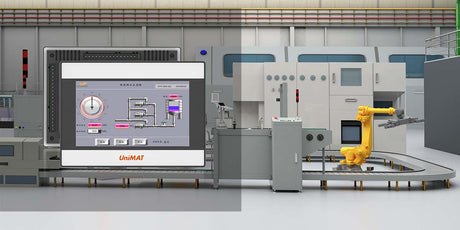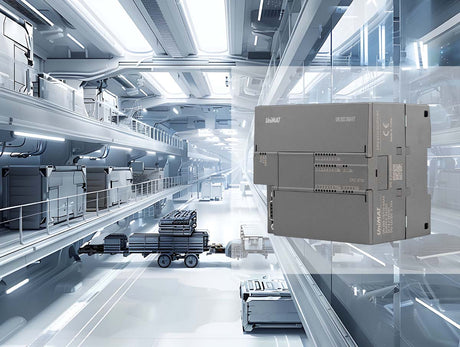Water treatment plants are critical infrastructures that demand precise,reliable,and adaptable automation systems.From chemical dosing to filtration and distribution,every stage requires seamless coordination.A modular PLC(Programmable Logic Controller)is the cornerstone of modern water treatment automation,offering the flexibility to scale with operational needs while ensuring robust performance.Among industry-leading solutions,the Unimat UN 300 Series PLC stands out for its modular architecture,advanced functionality,and ease of integration.This article explores why modular PLCs are essential for water treatment automation and how the Unimat UN 300 Series delivers tailored control for medium to large-scale systems.

Why Modular PLCs Are Ideal for Water Treatment Plants
Water treatment processes involve complex workflows,stringent regulatory compliance,and varying operational scales.Modular PLCs address these challenges by providing:
Customizable Configurations:Mix and match I/O,communication,and specialty modules to suit specific processes.
Future-Proof Scalability:Expand capacity as plant demands grow,without replacing the entire system.
High Reliability:Redundant systems and fault-tolerant designs minimize downtime in critical applications.
Simplified Maintenance:Isolate and replace modules without disrupting entire operations.
Unimat UN 300 Series PLC:Engineered for Water Treatment Excellence
The Unimat UN 300 Series PLC is designed to meet the rigorous demands of water treatment automation.Its modular design,combined with robust performance,makes it a top choice for engineers and plant managers.Here’s why:
1.Modular Design for Tailored Solutions
The UN 300’s modular architecture allows seamless integration of:
Digital/Analog I/O Modules:Monitor flow rates,pH levels,pressure,and turbidity.
Communication Modules:Support for Ethernet/IP,Modbus TCP,Profibus,and OPC UA ensures compatibility with SCADA,IoT platforms,and legacy systems.
Specialty Modules:Handle PID control for precise chemical dosing or motor management for pumps and valves.
2.Advanced Process Control Capabilities
Real-Time Data Monitoring:Track critical parameters like chlorine levels,filter backwash cycles,and reservoir volumes.
Automated Alarms&Diagnostics:Detect leaks,pump failures,or sensor malfunctions and trigger corrective actions.
Energy Optimization:Adjust pump speeds and chemical dosing based on real-time demand,reducing waste and energy costs.
3.Robust Performance in Harsh Environments
Rated for IP65 protection,the UN 300 withstands moisture,dust,and temperature fluctuations common in treatment plants.
4.User-Friendly Programming&Integration
Supports ladder logic,function block diagrams(FBD),and structured text for flexible programming.
Enabling drag-and-drop logic design and seamless integration with HMIs and cloud platforms.
Key Applications of the UN 300 PLC in Water Treatment
Chemical Dosing Systems:Use analog inputs and PID modules to automate precise chemical injection(e.g.,chlorine,coagulants).
Filtration Control:Manage backwash cycles,valve actuation,and filter pressure with digital I/O and timer functions.
Pump Stations:Coordinate multiple pumps for load balancing,surge prevention,and energy-efficient operation.
Wastewater Sludge Handling:Control centrifuges,conveyors,and dewatering systems using high-speed counters and motor control modules.

Implementing the UN 300 PLC in Your Water Treatment Plant
Assess Process Requirements:Identify I/O points,communication protocols,and safety standards(e.g.,SIL-2).
Design the Modular Setup:Select base units,power supplies,and modules(e.g.,analog for pH sensors,RS-485 for legacy devices).
Deploy&Program:Install hardware,develop control logic,and integrate with SCADA/MES systems.
Test&Validate:Simulate scenarios like peak demand or equipment failure to ensure system resilience.
FAQs:Modular PLCs for Water Treatment Automation
Q:Is the UN 300 suitable for remote monitoring?
A:Absolutely.With IoT-enabled modules,data can be accessed via cloud platforms for real-time oversight.
Q:How does it reduce operational costs?
A:Energy-efficient motor control,predictive maintenance alerts,and reduced downtime lead to significant savings.
Why Choose the Unimat UN 300 Series?
Scalability:Start with a basic setup and expand as your plant grows.
Global Support:Unimat provides technical assistance and training.
Conclusion
For water treatment plants seeking a modular PLC system that combines flexibility,reliability,and scalability,the Unimat UN 300 Series is a future-proof solution.Its ability to adapt to evolving regulations and operational needs makes it an indispensable tool for achieving efficient,sustainable water management.
Upgrade Your Water Treatment Automation Today!
Contact Unimat to request a customized UN 300 PLC configuration or download the product datasheet for detailed specifications.









